Key takeaways:
- Fireground fatigue can affect both physical and mental performance, leading to decreased reaction times and decision-making abilities.
- Key contributors to fatigue include physical exertion, psychological stress, and sleep deprivation.
- Effective fatigue management techniques include frequent hydration breaks, scheduled rest periods, and leaning on teamwork.
- Rest and recovery are crucial for maintaining mental and emotional well-being, enabling firefighters to perform safely and effectively.
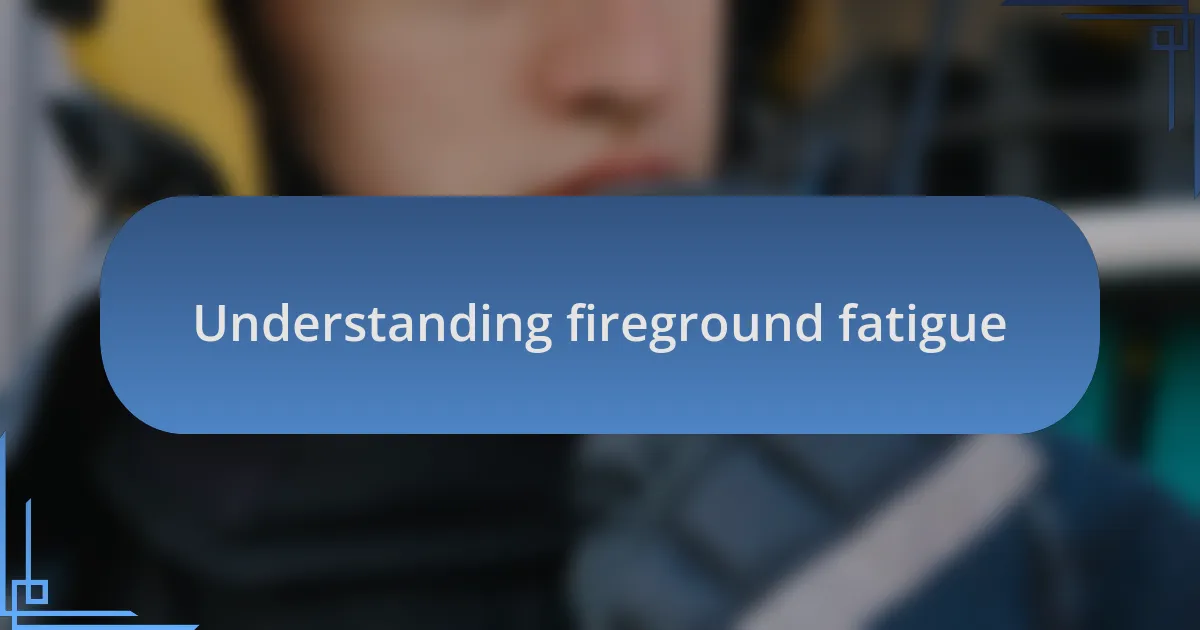
Understanding fireground fatigue
Fireground fatigue is something that can sneak up on even the most seasoned firefighters. I remember a particular call where I thought I was just tired, but in reality, my body was warning me about the impact of stress and exertion over time. It’s easy to dismiss the signs, but how can we effectively recognize when that fatigue is starting to hinder our performance?
When we’re deep in the action, adrenaline fuels our resolve, but that rush can mask the fatigue brewing beneath the surface. I’ve felt that strange mix of exhilaration and exhaustion, pushing through a tough fire only to collapse in the aftermath. Have you ever found yourself questioning your alertness even after you’ve completed a challenging task? Recognizing that feeling is crucial; it serves as a powerful reminder that we need to monitor our bodies closely and understand that fatigue can lead to dangerous decision-making.
Moreover, the mental toll of fireground fatigue is often overlooked. I’ve had instances where my mind felt hazy, struggling to process information during a critical moment. It’s a humbling experience that drives home the point that our emotional and mental well-being is just as important as our physical strength. How do we strike that delicate balance between pushing ourselves and acknowledging our limits? It’s essential to have tools and strategies in place to manage these feelings, ensuring that we can serve effectively and safely.
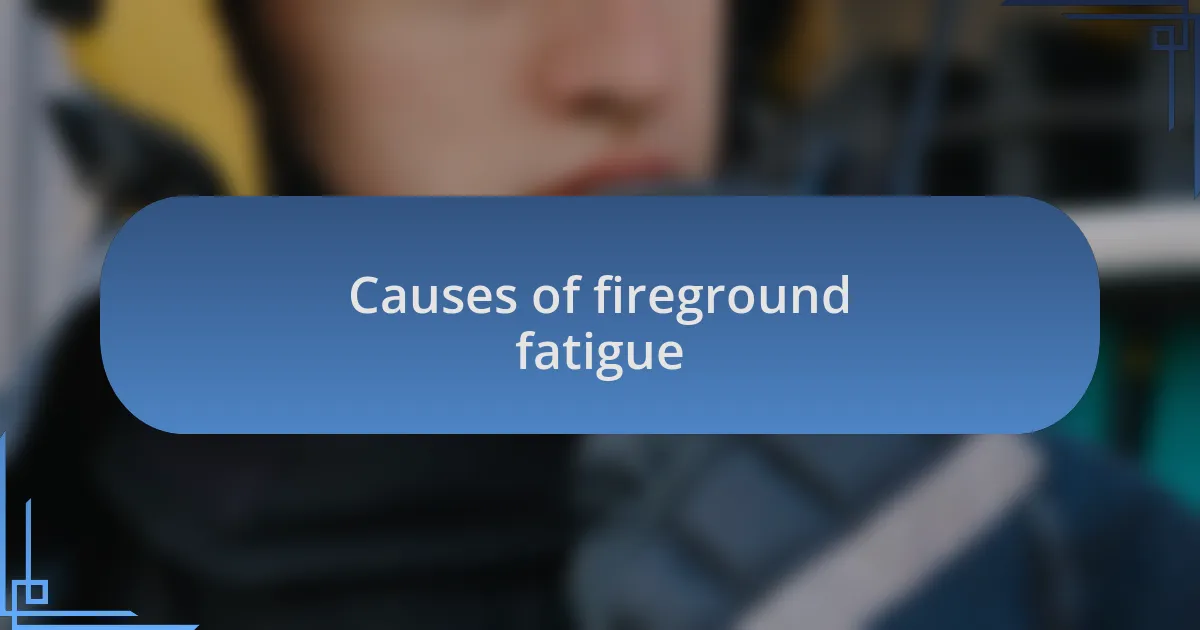
Causes of fireground fatigue
The causes of fireground fatigue can be attributed to several factors, but one of the most significant is the sheer physical demand of the job. I remember one intense evening when I had to haul hoses up a steep incline while battling blinding smoke. That effort took more than just strength; it drained my energy reserves quickly, leaving me feeling like I was running on empty. It’s crucial to recognize that even a single call can push our bodies beyond their limits.
In addition to physical exertion, the psychological pressures on the fireground contribute significantly to fatigue. I’ve often found myself in situations where the stakes were high, and the weight of responsibility rested solidly on my shoulders. It can feel like a never-ending cycle of stress, making it hard to concentrate or even catch my breath. Does that sound familiar? That mental strain can amplify feelings of tiredness, leading to a state where I’m physically present but mentally checked out.
Lastly, sleep deprivation plays a pivotal role in the development of fireground fatigue. During busy shifts, restful moments become a rare luxury. I’ve experienced nights where I counted the minutes between calls, barely resting at all. When you combine that lack of sleep with the physical and emotional demands of firefighting, it’s no wonder that fatigue creeps in, impacting our focus and performance. Recognizing these contributing factors is the first step toward staying sharp and safe on the fireground.
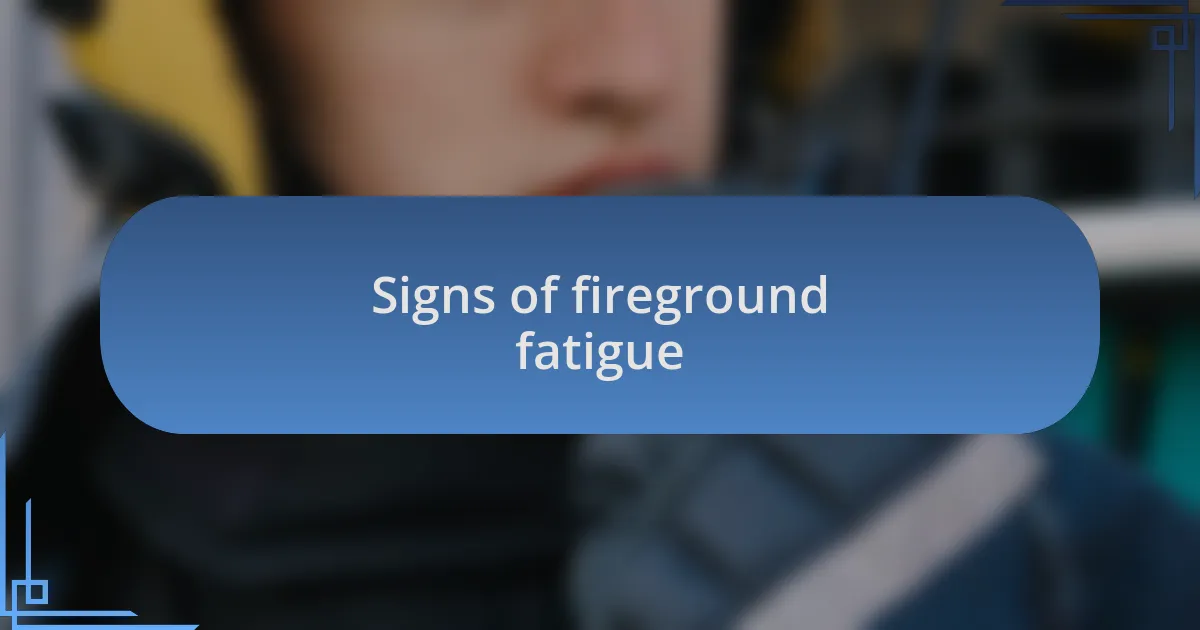
Signs of fireground fatigue
When I’m immersed in a fireground scenario, one of the first signs of fatigue I notice is a decline in my reaction time. I recall a time when we were in a rapidly evolving situation, and I found myself hesitating before responding to radio calls. It was unsettling, as I pride myself on being alert and responsive. Have you ever felt that lag in your reactions? It’s a clear indicator that my body is telling me to slow down.
Another telling sign is the struggle to concentrate on tasks. I can think back to an instance where I was tasked with setting up equipment, but my mind felt clouded, and the simple steps seemed overwhelming. This confusion can sne sneak up on you, even in the midst of familiar routines. It’s a reality that can affect even the most seasoned firefighters; when the mind becomes unfocused, safety can be compromised.
Physical symptoms also play a significant role. I’ve experienced the heaviness in my limbs after prolonged exertion, almost like they had turned to lead. During one intense call, my muscles started to scream for relief, and I started doubting my ability to continue. Have you ever experienced that overwhelming wave of exhaustion that makes you question if you can keep going? It’s a reminder that listening to our bodies is vital, as pushing through can lead to dangerous mistakes.
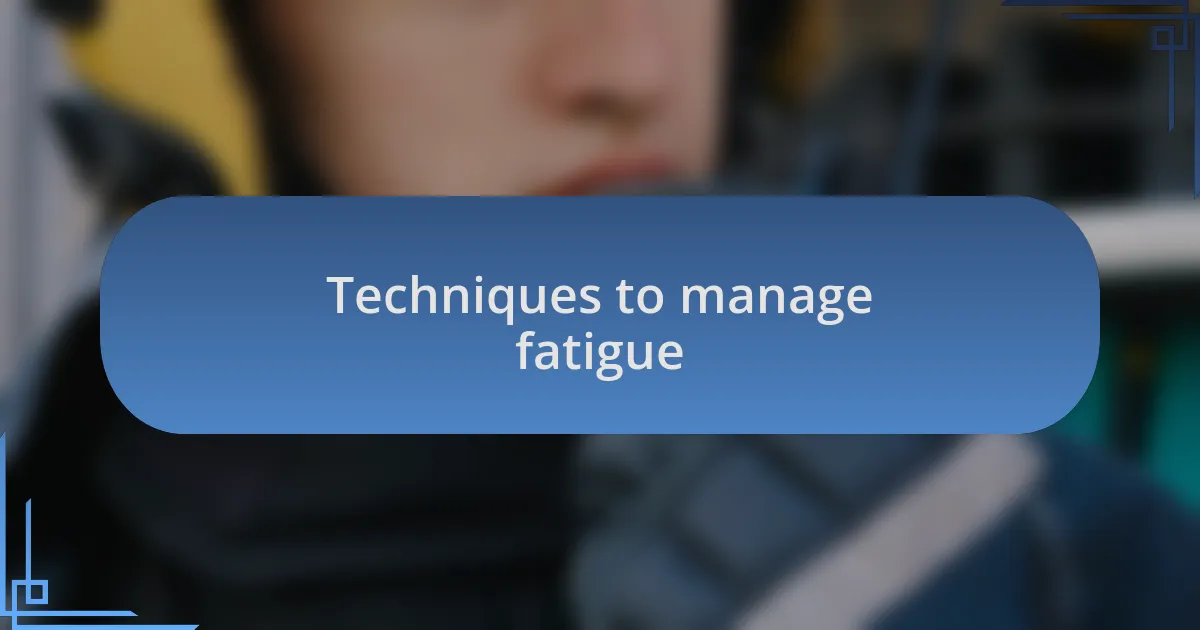
Techniques to manage fatigue
One effective technique I find valuable for managing fatigue on the fireground is frequent hydration breaks. I remember a particularly intense training session where I neglected to drink water, and my performance began to plummet. I felt drained, my coordination faltered, and it hit me—hydration truly is crucial for maintaining energy levels. Have you ever noticed how easy it is to forget the basics when you’re in the thick of it?
Another approach I implement is scheduling regular brief rest periods during operations. I think back to a call where we had to set a perimeter around a structure fire, and after a solid hour of moving equipment, we took a few minutes to breathe and regroup. That small time-out allowed us to return to the task focused and ready to tackle whatever came next. It made me realize that a moment of pause can be a game-changer, right?
Additionally, I find that leaning on teamwork plays a vital role in alleviating fatigue. There was an instance when we were short-staffed and I felt the weight of the world on my shoulders. However, when I reached out to my colleagues for support, we managed to share the load and lighten the burden. I ask you—how often do you lean on your team? A strong network can help distribute the physical and mental demands we face, allowing us all to work more efficiently together.
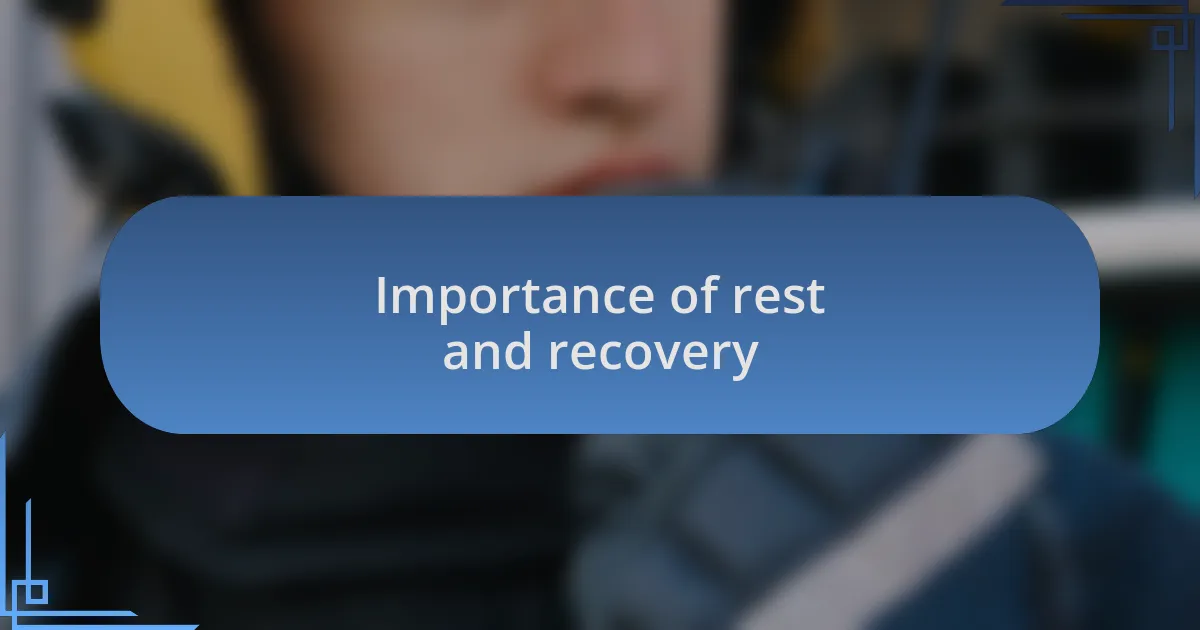
Importance of rest and recovery
Recognizing the importance of rest and recovery is crucial for maintaining peak performance on the fireground. I can’t recall the number of times I’ve pushed through sheer exhaustion, only to find my judgment slipping at a critical moment. One incident stands out when we were fighting a stubborn wildfire late into the night; I insisted on staying active rather than resting. Unfortunately, I misjudged a critical safety move due to fatigue. It showed me just how vital it is to rest—our minds and bodies need that time to recharge, especially in high-stress situations.
Recovery isn’t just about taking a break; it’s about giving yourself permission to step back and refocus. After a grueling day of training involving live fires, I would often sit alone, reflecting on my decisions, understanding my limitations, and what I needed to improve. This time was not just restful; it allowed me to reconnect with my purpose as a firefighter. Have you ever thought about how the moments of solitude can lead to invaluable insights?
Moreover, the emotional toll of firefighting can be heavy, and rest is essential for mental recovery as well. During a particularly relentless week of calls, my mental state began to unravel. I realized the importance of taking a day just to unplug and engage in activities that brought me joy—like fishing. Those moments not only revitalized my spirit but also prepared me to face the next challenge ahead. What do you do to ensure your mental well-being during those tough stretches? The balance between action and recovery is vital, as it enables us to remain effective and resilient.
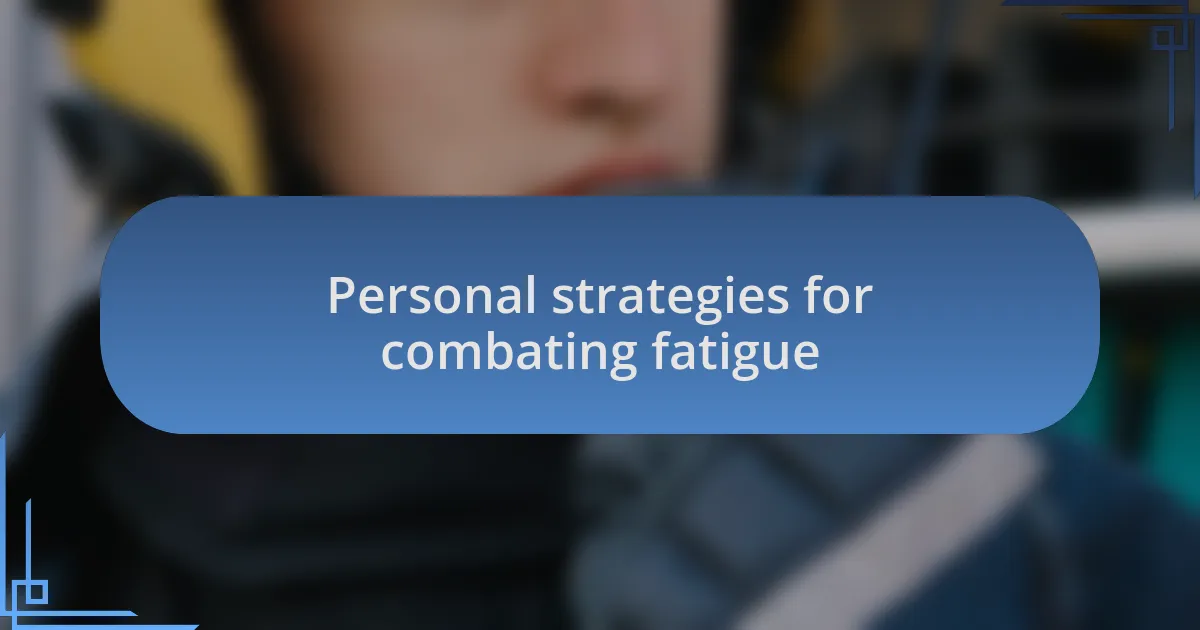
Personal strategies for combating fatigue
Finding personal strategies to combat fatigue is essential for every firefighter. Personally, I’ve discovered the power of strategic micro-breaks during intense operations. Even just a few minutes to hydrate and breathe deeply can reset my focus and energy. Have you ever noticed how a small pause can change your perspective on a situation? It’s a game-changer for me.
I also prioritize sleep above all else. During a particularly demanding week, I committed to turning off my phone an hour before bed. This simple act allowed me to wind down and disconnect from the stresses of the day. Since making this change, I’ve seen significant improvements in my concentration during calls. I often ask myself, how effective am I when I’m running on empty? The answer has always been clear: not very.
Lastly, I practice mindfulness techniques to combat mental fatigue. After a challenging incident, I’ve found that taking a few minutes to meditate or simply sit in silence can significantly enhance my mental clarity. It’s amazing how quickly you can recharge with just a moment of intentional stillness. Do you take time to center yourself after a tough run? Finding what helps you personally is key, and I can attest that these practices have transformed my approach to fatigue management.

Sharing experiences with colleagues
Sharing stories with my fellow firefighters has become one of my crucial coping mechanisms. The camaraderie built through these conversations often reveals shared struggles with fatigue that we all face during demanding shifts. I remember one night, during a particularly grueling call, a colleague and I just stood together, recalling past incidents and how we overcame them. It felt like a weight was lifted, reminding us that we’re not alone in this battle.
Discussing personal experiences fosters a sense of belonging and reassurance. I’ve found that when we openly share our fatigue challenges, we often receive practical tips in return. For instance, one firefighter suggested a simple breathing technique that I now rely on during overwhelming moments. It strikes me how these moments of vulnerability can turn into powerful learning opportunities for all of us.
Engaging in this dialogue not only alleviates the sense of isolation in our work but also strengthens our connections. It’s interesting to see how sharing a laugh about a tough call or discussing ways to manage stress can form bonds that feel like family. Have you ever had one of those conversations that sticks with you long after? I know I have, and those shared insights ultimately enrich our team’s resilience.